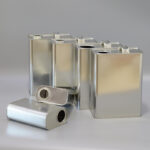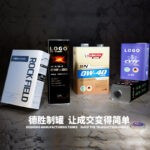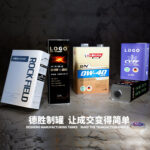- Lubricating oil base oil
Lubricating base oils are mainly divided into two categories: mineral base oils and synthetic base oils. Mineral base oils are widely used and used in large amounts (about 95% or more). However, in some applications, products formulated with synthetic base oils must be used, which has led to rapid development of synthetic base oils. Mineral oil base oil is refined from crude oil. The main production processes of lubricating base oil include: atmospheric and vacuum distillation, solvent deasphalting, solvent refining, solvent dewaxing, clay or hydrogenation supplement refining. In 1995, my country's current lubricant base oil standards were revised, mainly the classification method was revised, and two types of special base oil standards, low condensation and deep refined, were added. In the production of mineral lubricants, the most important thing is to select the best crude oil.
The chemical composition of mineral base oils includes high boiling point, high molecular weight hydrocarbons and non-hydrocarbon mixtures. The composition is generally alkane (straight chain, branched chain, multi-branched chain), cycloalkane (monocyclic, bicyclic, polycyclic), aromatics (monocyclic aromatics, polycyclic aromatics), cycloalkyl aromatics and oxygen-containing, nitrogen-containing, Sulfur-containing organic compounds and non-hydrocarbon compounds such as gums and asphaltenes.
- Additive
Additives are the essence of modern high-grade lubricants. Correct selection and reasonable addition can improve their physical and chemical properties, impart new special properties to the lubricant, or enhance some of its original properties to meet higher requirements. According to the required quality and performance of lubricants, careful selection of additives, careful balance, and reasonable deployment are the key to ensuring the quality of lubricants. Commonly used additives are: viscosity index improvers, pour point depressants, antioxidants, detergents, dispersants, friction reducers, oily agents, extreme pressure agents, antifoaming agents, metal deactivators, emulsifiers, corrosion inhibitors, Rust agent, demulsifier.
How to choose lubricating oil
Type: Synthetic engine oil has good stability, good fluidity, long oil change interval, and can protect the engine to the greatest extent, so it is basically suitable for most car models. However, because the price of fully synthetic engine oil is generally higher, some small cars with smaller engine loads in the industry prefer semi-synthetic or mineral oil for economic reasons. In addition, the grade of oil products can only be improved but not reduced. For example, it is stipulated that semi-synthetic oil can be replaced with synthetic engine oil, and it is stipulated that synthetic engine oil cannot be replaced with semi-synthetic oil.
Mileage: If you care more about the price, and you have a lot of mileage, change the oil more frequently, use mineral oil and some synthetic oils, but if you drive very rarely and only change the oil once a year, it is recommended to use a better one , Fully synthetic oil. As for the viscosity grade, for example, some European and Japanese manufacturers have recommended the use of low-viscosity motor oils such as 5W-20 for environmental protection and fuel-saving considerations in recent years. You only need to follow the manufacturer's recommendation.
Viscosity: First of all, it is recommended that you use the specifications recommended by the vehicle manufacturer, but note that the viscosity guidelines of the vehicle manufacturers are only based on an average value. You can refer to the vehicle environment to choose the oil. For example, if the environment is colder than most places or the engine load is higher than most vehicles, the smaller number in front of W and the larger the small bar should be used (such as SAE 5W-30 is recommended, and 0W can be considered in colder environments. -30 or consider 5W-40 in a hotter environment).
Car age: For old cars that have been driving for more than 10 years and have a mileage of more than 200,000 or even 300,000 kilometers, you can consider using high-viscosity oils such as 15W-40 and 15W-50. The advantage of this oil is that the sealing will be better. It is better, it is easier to maintain oil pressure and reduce oil consumption. Most of this oil is mineral oil. If the old car uses medium and low viscosity oil, it may cause insufficient oil pressure, which will not meet the lubrication requirements of the engine, and aggravate wear, which is harmful and not beneficial.
Brand and price: Of course, brand and value have always been important attributes of commodities. The lubricating oil market is mixed, and it is generally difficult to distinguish the quality of engine oil based on appearance. The principles of "you get what you pay for" and "brand represents quality" are also applicable to engine oil. But pay attention to the choice of engine oil. You can't just ask for good and noble oil. The best one is suitable and affordable. Of course, for base oils, synthetic ones are definitely better than mineral ones










